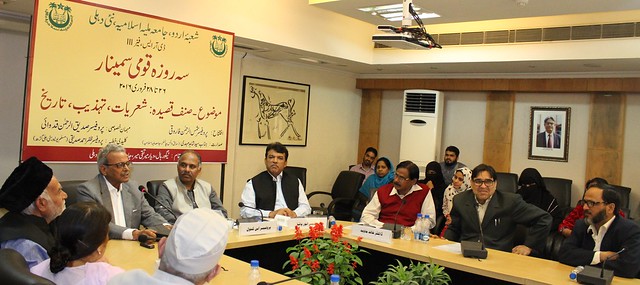By TCN News,
New Delhi: A three-day seminar on Urdu’s classical genres was successfully organised by UGC Departmental Research Support (DRS) between February 26-28 at Jamia Millia Islamia, New Delhi.
The Department of Urdu, Jamia Millia Islamia was sanctioned with the third phase of Departmental Research Support (DRS) under Special Assistance Programme (SAP) for a period of 5 years on the recommendation of the Expert Committee constituted by the University Grants Commission (UGC).
The seminar was attended by many eminent intellectuals, litterateurs, academics, research scholars and Urdu lovers.
Underscoring the significance of the classic genres, eminent Urdu critic and theorist Prof. Shamsur Rahman Faruqi said, “We seldom ponder as to why a genre comes into being, how its basic features take shape and why a literary genre declines. In fact, an entire civilization and literary culture remains in the backdrop of a genre taking its birth, developing and gradually waning out.”
“If we ignore classical genres, the loss remains that of a civilization itself and that of an entire cultural and creative legacy,” Faruqi added.

Eminent intellectuals, litterateurs and academics like Syed Shahid Mahdi, a former vice chancellor of Jamia Millia Islamia, Prof. Zafar Ahmed Siddiqui, Prof. Mehr Afshan Farooqi, an Astt. Professor, University of Virginia, Prof. Shahpar Rasool, head of the Urdu department, JMI, Prof. Wahajuddin Alwi, Prof. Iraq Raza Zaidi, Prof. Siddiqur Rahman Qidwai, Prof. Ibne Kanwal, Prof. Shehzad Anjum, Prof. Kausar Mazhari, Prof. Nadeem Ahmad, Prof. Ahmad Mahfooz, Prof. Moinuddin Jinabade, Prof. Anwar Pasha, Dr. Suhail Ahmad Faruqi, Dr. Khalid Mubashshir attended the seminar. Also present were Prof. Anees Ashfaq, Prof. Shamsul Haq Usmani, Mohd. Muqeem, Dr. Tariq Saeed, Dr. Sarwarul Huda, Prof. Mohd. Zakir, Prof. Shahnaz Anjum, Prof. Baran Faruqi, Dr. Imran Ahmed Andaleeb, amongst a large number of research scholars and Urdu lovers.
Expressing his satisfaction on the large number of participants on deeply scholarly topics, Syed Shahid Mahdi termed the seminar a symbol of freedom from the neo-colonial effects.
Speaking on the history of Qaseeda, a classic Urdu genre, Prof. Zafar Ahmad Siddiqui said, “While Qaseeda has its origins in Arabic language, its poetics were developed and perfected only in Persia and it was taken to new heights of style and creativity when embraced by Urdu classic poets in India.”
Prof. Ahamd Mahfooz said, “In our times, the critics of classical genres are becoming a rare breed. In such times the importance of a seminar on these genres cannot be overemphasised.”
Virginia University’s Assistant Prof. Dr. Mehr Afshan Farooqi lamented the decreasing appeal of classic genres amongst new generation. Its reason, according to her, is the general lack of interest towards reading.
Prof. Ibne Kanwal believes that classic genres are not just a part of our literary tradition but they are also a window for us of the era gone by. Prof. Anwar Pasha termed the Qaseeda as mother of all genres. “Exaggeration is not bad in itself, as it is based on imagination and no good literature can flourish without imagination,” he said.
Prof. Shahpar Rasool informed that under the DRS Phase-III, individual seminars on Qaseeda, Marsia, Shahr Ashob, Wasokht, Ghazal and other classical Urdu genres will be organised and papers presented in them will be published as separate books.
Prof. Chandra Shekhar, who presided the second day session of the seminar, did not agree with the idea of the decline of classical genres as he deemed them a genre shift. “Every era finds its own new ways of expression,” averred he.
Speaking in the concluding session of the seminar, Prof. Shamim Hanafi said, “Poetics belong more to the era than to the genres and the effects of poetics are seen on all genres of its era. As time changes, words also acquire new meanings. In Urdu’s classical genres life, universe, man and time are present in full dynamism and vitality and the process of their rediscovery will continue to dominate all times to come in a different idiom.”

